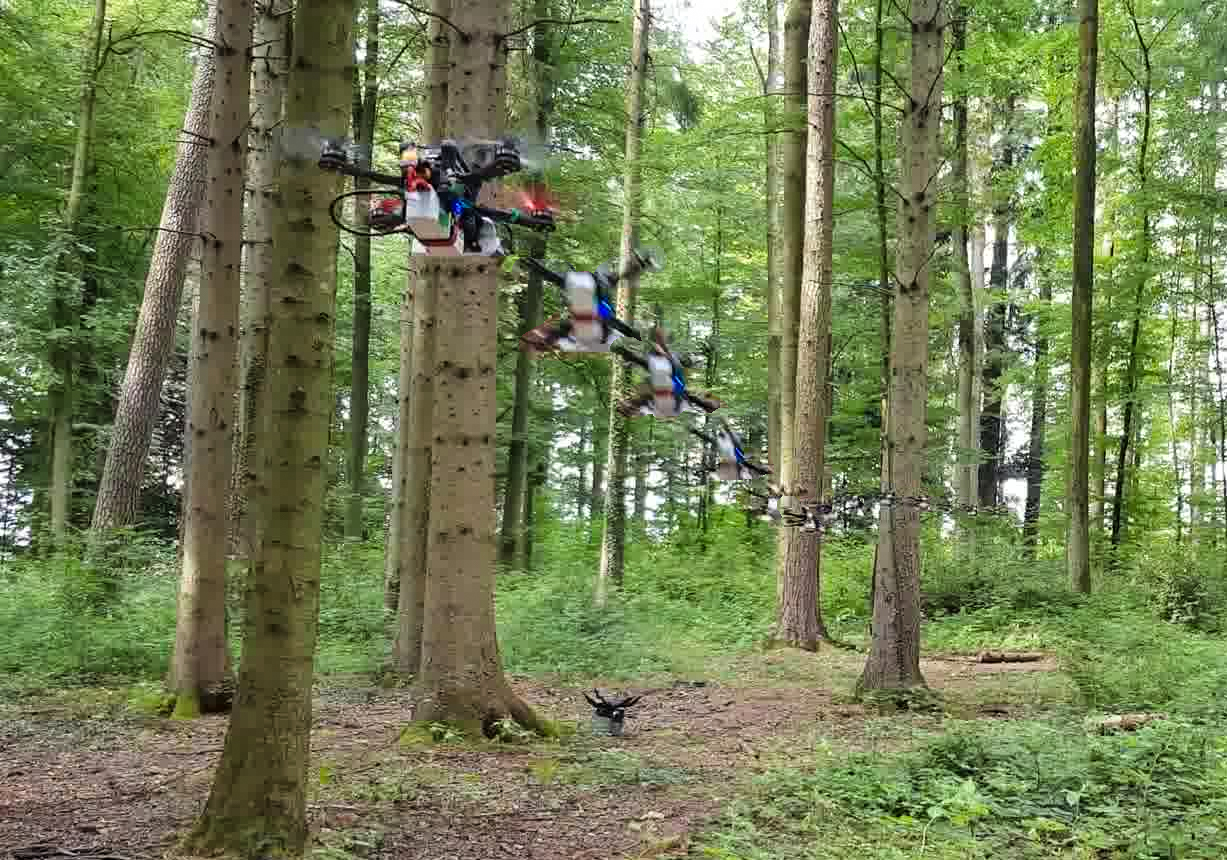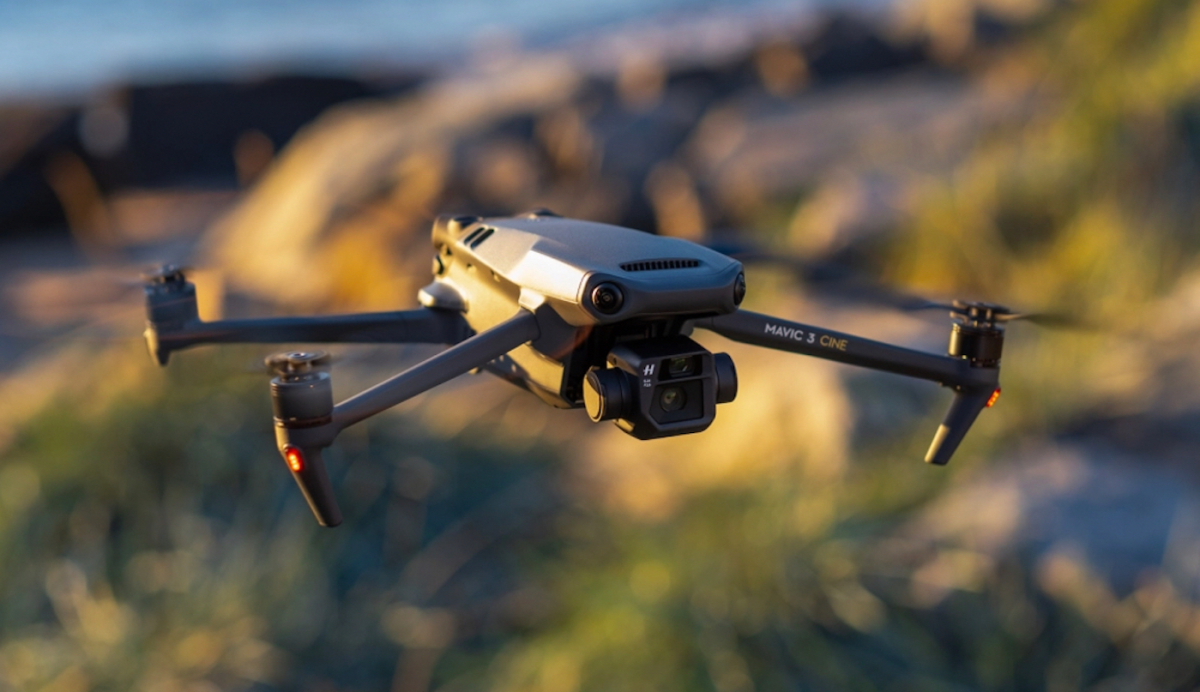Switzerland’s lead in AI drone technology raises ethical questions

Switzerland shrugs off responsibility for setting rules governing the development of technology with military potential.
Positioning itself as a top research location at the forefront of drone development and artificial intelligence (AI) is key for Switzerland. Its technical universities are amongst the best in the world. Measured by quality of scientific publications and their impact on research, Switzerland even ranks number oneExternal link. The greater Zurich area is know as “the Silicon Valley of robotics” thanks to the presence of Google and other leading companies, as well as its first-class university laboratories.
Risks that come along with such cutting-edge research do not feature prominently in the narrative promoted by authorities. The scientific community however regularly raises them. AI researchers have been worried for some time about an arms race in AI-powered weapons, including drones. 2017 saw the release of the viral Slaughterbots videoExternal link, a fictional account of a dystopian future, in which mini-drones hunt down targeted individuals without any form of human control.
“A lot of politicians have not understood the technology well enough,” explains Max Tegmark, professor of physics at Massachusetts Institute of Technology in Boston, the leading technology university in the United States. “We are talking about weapons of mass destruction that would be accessible to everyone.” Tegmark directs the Future of Life InstituteExternal link, which produced the Slaughterbots video. Another voice is that of US military expert Zachary Kallenborn, who compares the dangers of armed drone swarms to those of chemical and biological weapons.

More
Swiss researchers warn about autonomous weapons
Lethal autonomous weapons have inched closer to reality in recent years. In 2021 the Israeli military launched a swarm of drones into the Palestinian Gaza Strip. It was the first time this AI-powered technology was applied on a battlefieldExternal link. In the autumn of 2022, the Israeli arms company Elbit Systems revealed a new type of kamikaze drone that autonomously identifies targets. It only takes the press of a button for a soldier to turn the drone into a killing machine. Once activated, it fires at the target or flies into it and explodes — a seamless symbiosis between combat decision-making, drone technology and AI.
Today, a person still has to trigger the lethal procedure of these weapons — and bear responsibility for it. This might change, however. A weapon with fully autonomous capabilities was deployed in Libya in 2020. The precise circumstances remain unclear, but a UN issued a reportExternal link states that the Turkish Kargu-2 drone may have attacked targets without human control.
+ Swiss army uses drone technology. Should we worry?
Along with Israel and Turkey, the armies of the US, China, the United Kingdom, India and other nations are working on similar technologies. Some of the algorithms that feed into this line of research are developed in Switzerland.
Ambiguous rules
Swiss universities usually keep a low profile on the potential military use of their technologies. The Swiss Federal Institute of Technology Lausanne (EPFL) is a glaring example of this ambiguity: neither the long-serving director of NCCR Robotics, Dario Floreano, nor the head of publicly financed NTN Robotics, Aude Billard, want to comment on the matter. Both leading researchers claim to be unaware to what extent technologies such as drone swarms are deployed for military use.
There is some regulation. Cooperations with military institutes have to be approved by the university and researchers have to abide by the dual-use guidelinesExternal link issued by the federal government. However, these rules are no longer fit for purpose in the case of the latest technologies, says Marcello Ienca, a researcher in the ethics of intelligent systems at EPFL: “In the 2020s, it is no longer possible to draw a clear line between civilian and military technologies,” he explains. “Export controls hardly work for AI because they focus on domain-specific applications, whereas AI is by definition for a general purpose. You can transfer software that is then used elsewhere for weapons systems.”
Research in Switzerland follows the open-science principle, meaning that results should be made publicly available. “Lethal autonomous weapons increase the dilemma between free research and potential misuse to the extreme,” explains Ienca. “There is consensus among ethicists that we should not build machines that can autonomously decide on questions of life and death. I don’t think anyone in Switzerland would intentionally work on such systems.” And yet, Ienca adds: “Even research with the best intentions can be misused by third parties for military or criminal purposes.” The Swiss National Science Foundation (SNSF), which supports numerous research projects, likewise states that “it is impossible to predict which applications might be based on these findings in the future”.

More
‘We don’t want killer robots’
Ienca sees two ways to address the dilemma without jeopardising research: researchers who receive funding from military institutes should disclose this and clarify how they deal with conflicts of interest. And universities should systematically make scientists aware of the risks — with safety trainings that have long been established in chemical and biological research.
Ethical decisions left to individuals
There are no nationwide procedures to this end in Switzerland. While the University of Zurich has an awareness plan for researchers, it has no mandatory training programmes. The EPFL runs compulsory ethics courses for new students, but they are voluntary for already existing teams, meaning that a lot depends on the individual professors.
Meanwhile, Elbit Systems, the Israeli defence contractor that has driven the development of AI-guided drones for military use, has two subsidiaries in Switzerland. The new Swiss reconnaissance drone, the ADS15, is an Elbit product. On its website, the firm emphasises how high the technological standards are in Switzerland and how attractive the country’s research centres.
The SNSF, which promotes joint research between Israel and Switzerland, writes that “research has to be organised so that it cannot be misused.” In certain cases the SNSF reacts if it suspects risks. However, responsibility rests “primarily with the researchers and their research institutions,” the Science Foundation states. There is, up until now, no standardised self-assessment for researchers into risks linked to non-peaceful applications.
Innosuisse, which promotes commercial research spin-offs on behalf of the federal government, sensitises its applicants. But compliance with the relevant legal requirements lies with the companies: “Innosuisse is unable to assume responsibility in this respect,” the public innovation agency writes in an emailed statement.
The federal government has issued guidelines for SNFS and Innosuisse, but no binding requirements. “The universities and their researchers are in charge of scientific integrity,” writes the State Secretariat for Education, Research and Innovation (SERI). “How this is managed varies widely.”
This investigation was supported by a grant from the JournaFONDS. It first appeared in SonntagsBlick on January 15, 2023.


More
Swiss army chief moots future purchase of armed drones

In compliance with the JTI standards
More: SWI swissinfo.ch certified by the Journalism Trust Initiative










You can find an overview of ongoing debates with our journalists here . Please join us!
If you want to start a conversation about a topic raised in this article or want to report factual errors, email us at english@swissinfo.ch.